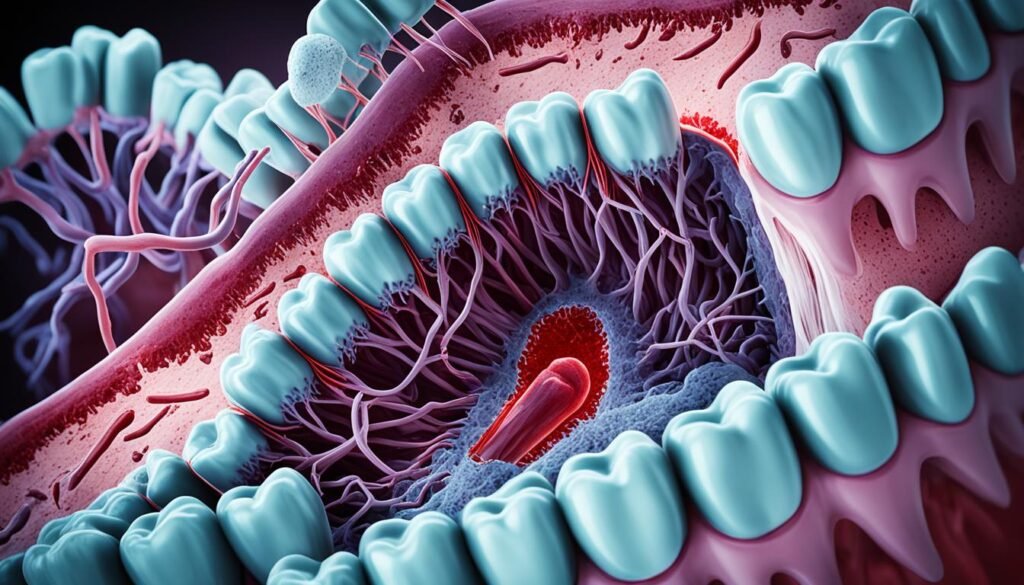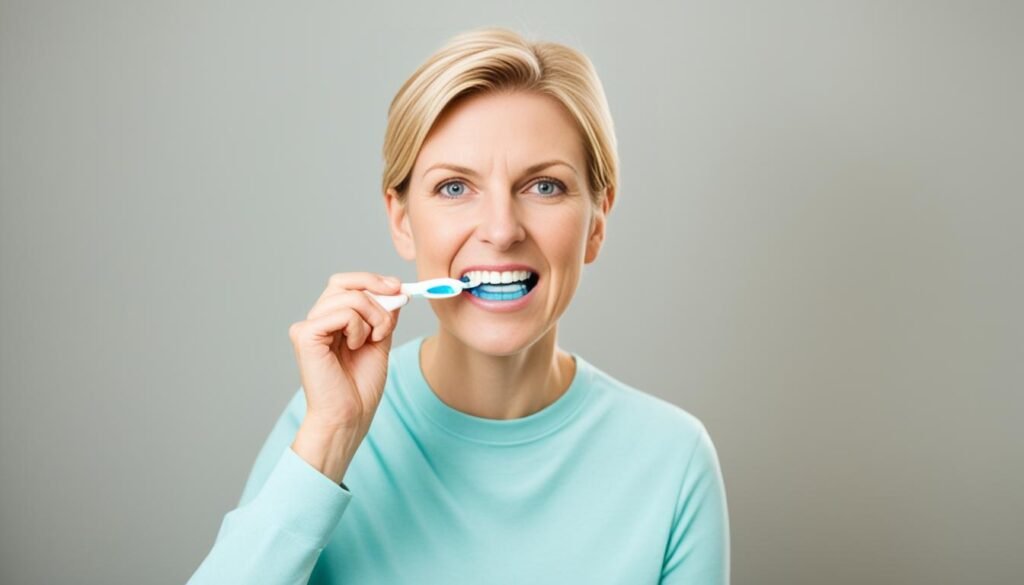Every morning, as I brush my teeth, I think about the tiny world inside my mouth. It’s full of bacteria, both good and bad. These microbes are key to my health. Knowing about oral bacteria helps keep my smile and body healthy.
Growing up, I learned about brushing my teeth, but I didn’t know how it affected my health. When I faced gum problems, I realized the link between my mouth and body. I decided to learn more about oral bacteria and their effects on my health.
Key Takeaways
- Oral bacteria play a crucial role in maintaining overall health and well-being
- Imbalance in oral bacteria can lead to a variety of health problems, from tooth decay to chronic inflammation
- Understanding the complex ecosystem of the oral microbiome is essential for preserving good oral hygiene
- Proper dental care, including regular brushing, flossing, and professional cleanings, is key to keeping oral bacteria in check
- Emerging research suggests a strong link between oral health and conditions like cardiovascular disease, brain health, and diabetes
The Oral Microbiome: A Thriving Ecosystem
The human mouth is a bustling place, filled with over 700 types of tiny living things. These tiny creatures live together in a delicate balance. They are part of the oral microbiome. This group of bacteria, viruses, and fungi is key to keeping our mouths and bodies healthy.
Biomes and Microbiomes: An Introduction
Every part of the mouth has its own special group of microbes. From the hard teeth to the soft tongue, these tiny beings have made their homes. They live in harmony with us, forming a special bond.
Population, Distribution, and Diversity
- The oral microbiome has about 6 billion microbes, making it one of the most diverse places in our bodies.
- These microbes live in different parts of the mouth, each with its own special conditions.
- Things like our genes, what we eat, how we live, and how we brush our teeth can change the oral microbial population and oral microbial diversity.
| Key Statistic | Value |
|---|---|
| Number of oral microbiome species | Over 700 |
| Total population of oral microbes | Approximately 6 billion |
| Percentage of oral microbiome samples gathered through metagenomics, metatranscriptomics, and viromics techniques | 13% |
| Prevalence rate of toothbrush contamination | 68% |
Learning about the oral microbiome is key to keeping our mouths and bodies healthy. As we explore more about microbiomes and biomes, we see how these tiny communities affect our health.
Beneficial Oral Bacteria: Nature’s Helpers
Our mouths are full of different kinds of tiny organisms. Some are bad, but many are good. They help keep our mouths healthy.
Scientists have found many good bacteria in our mouths. These include Streptococcus sanguinis, Streptococcus oralis, Actinomyces naeslundii, and Veillonella dispar. These beneficial oral bacteria help our bodies stay healthy. They keep away bad bacteria that could cause problems.
Using oral probiotics can help these good bacteria grow. Oral probiotics are live good bacteria that help us when taken in the right amount. They can lower the risk of cavities, gum disease, and bad breath.
| Beneficial Oral Bacteria | Health Benefits |
|---|---|
| Streptococcus sanguinis | Keeps away harmful bacteria like Streptococcus mutans, which causes cavities. |
| Lactobacillus strains | Helps stop Candida albicans, a fungus that can cause mouth infections. |
| Fusobacterium nucleatum | Talks to our cells to show it’s friendly. It helps keep our mouths healthy. |
Learning about beneficial oral bacteria and using oral probiotics can make our mouths healthier. This helps us stay well and lowers the chance of mouth and other health problems.
Harmful Oral Bacteria: The Culprits Behind Dental Woes
The mouth is full of good bacteria, but it also has harmful ones. These bad bacteria can cause dental problems like bad breath, tooth decay, and gum disease.
Common Harmful Microbes
Some common bad oral bacteria are Streptococcus mutans, Porphyromonas gingivalis, Tannerella forsythia, Aggregatibacter actinomycetemcomitans, Prevotella intermedia, Candida albicans, Fusobacterium nucleatum, and Treponema denticola. These bacteria can grow in the mouth and upset the balance of bacteria.
Negative Health Effects of Harmful Microbes
Having these bad oral bacteria can cause health problems, including:
- Bad breath
- Plaque buildup
- Tooth decay (dental caries)
- Gum disease (periodontal disease)
If these problems are not treated, they can affect your overall health. Keeping your mouth clean and going to the dentist regularly helps prevent these issues.
“Over 700 separate types of bacteria are commonly found in the human mouth, with around 70 different types of both good and bad bacteria in the average person’s mouth at any given time.”
Oral Bacteria: Key Players in Plaque Formation
The oral microbiome is a delicate balance of good and bad bacteria. When this balance is upset, it can lead to the formation of a biofilm, or dental plaque. This biofilm acts as a safe place for bacteria, giving them food and protecting them from harm.
Inside the Matrix: Biofilms and Plaque
The oral microbiome matrix is a complex structure that holds a mix of microbes. Biofilms form when harmful bacteria like Streptococcus mutans stick to teeth and gums. This creates a protective layer that helps the bacteria grow and survive.
This dental plaque can cause big problems. The acids made by the bacteria can lead to cavities. It can also cause gingivitis, an inflammation of the gums, and even periodontitis, which can destroy bone around the teeth.
| Characteristic | Supragingival Biofilm | Subgingival Biofilm |
|---|---|---|
| Composition | Predominantly aerobic bacteria | Predominantly anaerobic bacteria |
| Location | Above the gums | Below the gums |
| pH Range | 6.7 – 8.3 | 6.7 – 8.3 |
| Temperature Range | 35 – 36°C | 35 – 36°C |
Understanding biofilms and dental plaque is key to good oral health. By knowing who these harmful bacteria are, we can fight them better and keep our mouths healthy.
The Oral Microbiome and Overall Health
Our mouths are filled with a complex ecosystem called the oral microbiome. This network of tiny organisms is key to keeping our mouths and bodies healthy. When this balance is upset, it can affect our health in big ways, linking our mouth health to inflammation and other health issues.
Inflammation: The Link Between Oral and Systemic Health
Too many bad bacteria and not enough good ones in our mouths can cause chronic mouth inflammation. This leads to conditions like gingivitis and periodontitis. These conditions can spread inflammation throughout our bodies.
Studies now show that this link between mouth and body inflammation is tied to many health problems. These include cardiovascular disease, diabetes, and neurodegenerative conditions. So, keeping our oral microbiome healthy is key for our overall health.
| Oral Microbiome Imbalance | Systemic Health Consequences |
|---|---|
| Overgrowth of harmful bacteria | Cardiovascular disease |
| Decline in beneficial microbes | Diabetes |
| Chronic oral inflammation | Neurodegenerative conditions |
By understanding how our oral microbiome affects our health, we can act to keep our mouths healthy. This helps our bodies stay well from the inside out.
Oral Bacteria and Cardiovascular Health
Research now links oral health closely with heart health. Bacteria from gum disease can move into the bloodstream through inflamed gums. This can cause blood vessel inflammation and increase the risk of atherosclerosis and heart disease.
Studies reveal that those with gum disease are 28% more likely to have a heart attack than those without dental issues. Also, people with gum disease face a three times higher risk of stroke, which can harm vision and other body functions.
Over 42% of adults on Medicare have a heart condition. Adding dental benefits to Medicare could save the healthcare system up to $27.8 billion annually for those with heart disease.
The connection between oral bacteria and heart health is clear. Researchers believe that childhood oral infections may increase the risk of heart disease later. Also, teens or young adults without dental care are more likely to have high blood pressure as adults.
| Statistic | Percentage |
|---|---|
| Individuals with dental infections and coronary atherosclerosis | 7% |
| Increase in prevalence and incidence of coronary heart disease in individuals with periodontitis | 23% |
| Systemic bacterial exposure markers in periodontal disease and cardiovascular disease risk | 21% |
| Increase in coronary heart disease incidence in individuals with periodontal disease | 17% |
| Accelerated atherosclerosis progression due to Porphyromonas gingivalis infection | 24% |
These figures show the big impact of oral bacteria and gum disease on cardiovascular health. Keeping up with good oral hygiene and regular dental visits can help protect the heart and overall health.
“Dental disease in childhood can contribute to atherosclerosis (clogged arteries) in adulthood.”
Oral Bacteria and Brain Health
Research is showing that the link between our oral bacteria and brain health is deeper than we thought. The oral microbiome, full of different microorganisms in our mouths, might help us understand neurodegenerative diseases like Alzheimer’s and dementia better.
Chronic inflammation, often caused by an imbalance in the oral microbiome, can lead to inflammation in the body that affects the brain. This inflammation may play a part in causing and worsening neurodegenerative diseases. It makes the brain’s delicate environment more prone to damage from ongoing inflammation.
Studies have found interesting links between certain oral bacteria and brain health. For example, Streptococcus mutans, known for causing tooth decay, is linked to a higher risk of brain bleeds and cognitive problems. People with chronic gum disease for over 10 years are also more likely to get Alzheimer’s disease.
| Oral Bacteria and Brain Health | Findings |
|---|---|
| Gut-brain axis studies | Significant associations between the oral microbiome and brain health |
| Dietary fat profile and gut microbiota | Linked to metabolic changes in mice |
| Oral microbiome and obesity | Associations found in research |
| Human microbiome | Identified as the second genome |
| Enteric microbiota, central, and enteric nervous systems | Interactions explored |
There is hope for improving brain health. Research points to using probiotics and eating foods that fight inflammation to balance the oral microbiome. By keeping our mouths healthy, we might lower the risk of neurodegenerative diseases and keep our minds sharp.
“The oral microbiome may be a harbinger for children’s health, as early markers of periodontal disease and altered oral microbiota have been associated with glycemic control in children with type 1 diabetes.”
Oral Bacteria and Diabetes
The link between oral bacteria and diabetes is complex and key. Gum disease, linked to an unbalanced oral microbiome, is tied to insulin resistance and poor diabetes control. This inflammation makes it harder for people with diabetes to manage their blood sugar.
About 25% of U.S. adults with diabetes over 50 have severe tooth loss, unlike 16% without diabetes. Gum disease, linked to diabetes, can move from inflamed gums to tooth loss. Gingivitis, the first gum disease stage, comes from plaque and tartar build-up. It can turn into periodontitis, an infection that harms the gums and bones holding teeth in place.
Diabetes also brings other oral issues like cavities, dry mouth, thrush, burning mouth syndrome, and taste changes. Signs include red, swollen, or bleeding gums, loose teeth, dry mouth, and bad breath. People with diabetes might struggle to get dental care and products they need, making these problems worse.
Good oral hygiene, like daily brushing and flossing, and regular dental visits, is key for those with diabetes. Treating periodontal disease and managing blood sugar improves oral and overall health. Quitting smoking, which raises the risk of diabetes and mouth problems, is also helpful.
The link between oral bacteria and diabetes shows why dental care is vital in managing diabetes. Addressing both conditions together helps improve health and well-being.
| Statistic | Percentage |
|---|---|
| U.S. adults with diabetes ages 50 and older who have severe tooth loss | 25% |
| U.S. adults without diabetes who have severe tooth loss | 16% |
Maintaining good oral hygiene through daily brushing and flossing, as well as regular dental visits, is crucial for individuals with diabetes.
Oral Bacteria and Obesity
Research is showing a link between oral bacteria and obesity. Our mouths have a special group of bacteria called the oral microbiome. This group might affect our weight and how our bodies process food.
A study looked at 313 overweight women with a BMI of 27 to 32. They compared them to 232 healthy women. The study found that almost all the overweight women had a certain bacterium, Selenomonas noxia, in high amounts.
This bacterium was found in 98.4% of the overweight women. The study also showed that overweight women had different bacteria in their mouths than healthy women. Some bacteria were more common in those who were overweight.
| Metric | Overweight Women | Healthy Individuals |
|---|---|---|
| Selenomonas noxia levels | Greater than 1.05% of total salivary bacteria | Less than 1.05% of total salivary bacteria |
| Median percentage difference in 40 bacterial species | Greater than 2% | Less than 2% |
| Correct identification of individuals | 98.4% of overweight | 80.2% of healthy |
The link between oral bacteria and obesity might be connected to how our mouth and gut bacteria work together. If our mouth bacteria are out of balance, it could affect our gut. This could lead to changes in metabolism and weight gain.
Keeping our oral microbiome healthy is key to managing our weight. As we learn more about our microbiome, we might find new ways to prevent obesity. This could lead to better health care for everyone.
“The oral microbiome is like a window into our overall health, and its connection to obesity is a fascinating area of research that could lead to groundbreaking advancements in weight management.”
Achieving Oral Health: Tips and Best Practices
Keeping your smile healthy is more than just about brushing and flossing. To really take care of your teeth and gums, you need a full dental care plan. By using these top oral hygiene tips, you can protect your teeth and gums. This helps you keep your mouth healthy for a long time.
Daily Brushing and Flossing
Not cleaning your teeth properly can lead to cavities and gum disease. Brushing with fluoride toothpaste twice a day and flossing once a day is key. Fluoride makes your teeth stronger against decay. Flossing gets rid of plaque and food bits between your teeth, which helps prevent gum disease.
- Brush with a soft-bristled toothbrush for at least two minutes, twice a day
- Use a fluoride toothpaste to strengthen enamel and prevent cavities
- Floss once a day to remove plaque and food debris between teeth
- Consider using a disclosing tablet or special toothpaste to identify areas where plaque is present
Regular Dental Visits and Cleanings
Preventive dentistry is crucial for a healthy smile. Going to the dentist regularly helps spot and fix problems early. At these visits, your dentist will clean away plaque and tartar. They’ll also give you advice to improve your brushing and flossing.
- Schedule routine dental exams and cleanings every six months
- Follow your dentist’s recommendations for additional fluoride treatments or specialized care
- Discuss any concerns or changes in your oral health with your dentist
- Seek prompt treatment for any dental problems to prevent further complications
By brushing and flossing every day and visiting the dentist regularly, you can keep your mouth healthy. This way, you’ll have a beautiful, confident smile for many years.
“Preventative dentistry gives you the best chance for a beautiful smile and long-lasting oral health.”
Oral Bacteria and Antimicrobial Resistance
The overuse and misuse of antibiotics have led to the emergence of antimicrobial-resistant bacteria in our mouths. These antibiotic-resistant microbes make it harder to treat mouth infections. They also disrupt the balance in our mouths, showing why we must use antibiotics wisely and find new ways to treat infections.
Studies have deeply explored the oral microbiome. They found different areas in our mouths with unique groups of bacteria. These bacteria are linked to many diseases, including pancreatic cancer and antibiotic resistance.
Oral biofilms are full of bacteria that resist antibiotics. This makes fighting off infections tough. Understanding the main bacteria in our mouths is key to better dental care.
Many oral bacteria carry genes for antibiotic resistance. This shows we need strong plans to fight antimicrobial resistance in dental care. New methods like whole-genome sequencing help us understand the healthy and sick mouths better.
Projects like the Human Microbiome Project have given us a lot of data. This data helps us see how different people’s mouths vary. It shows how age and lifestyle affect the types of bacteria in our mouths.
Working on the oral bacteria and antimicrobial resistance issue helps us find ways to keep our mouths healthy. This is good for our oral health and overall health. It also helps prevent diseases linked to our mouth bacteria.
Probiotics and the Oral Microbiome
Keeping the oral microbiome healthy is key for good dental health. Probiotics are live microorganisms that can help balance the oral ecosystem. They promote the growth of good bacteria in our mouths.
Many studies show probiotics can improve oral health. Inchingolo et al. found that Resveratrol can help balance the oral microbiome. Hasslöf et al. showed probiotics can reduce dental caries in kids.
Probiotics are getting more attention in dentistry. Farias da Cruz et al. looked into how probiotics and dairy can boost oral health. Andersson et al. explored probiotics and prebiotics’ effects on oral health and disease prevention.
Some studies focus on specific bacteria in our mouths. Di Cosola et al. linked Candida Albicans to oral cancer. Matsubara et al. found probiotics can fight fungal infections in the mouth.
Probiotics do more than fight bad bacteria. Inchingolo et al.’s review showed supplements like Resveratrol can help with bone health. This suggests they could improve overall health.
In conclusion, oral probiotics could be a game-changer for dental health. As we learn more, using probiotics in dental care could become more common. This could lead to better oral health for everyone.
“Probiotics can modulate the immune responses of the host, promoting host-microbe homeostasis.” – Metchnikoff E. (1906)
| Study | Key Findings |
|---|---|
| Colombini F. et al. (2020) | Consuming probiotics reduced the levels of salivary mutans streptococci by 67%. |
| Busscher HJ et al. (1997) | Streptococcus thermophilus and its biosurfactants inhibit adhesion by Candida spp. on silicone rubber by 95%. |
| Caglar E. et al. (2007) | 55% reduction in salivary mutans streptococci levels by using chewing gums containing xylitol or probiotic bacteria. |
Oral Bacteria: A Window into Overall Well-being
The human mouth is full of different microorganisms, known as the oral microbiome. This complex group is not just about our teeth but also shows our overall health. By looking at the balance and variety of these microbes, we can spot potential health problems early.
Having an unbalanced oral microbiome is linked to many health issues. These include heart disease, diabetes, Alzheimer’s, and respiratory infections. Poor oral hygiene can increase the risk of heart disease by up to 25%, and people with gum disease are more likely to get diabetes and heart disease.
The link between oral and overall health is two-way. Gum disease can cause inflammation in the body, which is a risk factor for many chronic conditions. On the other hand, diseases like diabetes can make oral health worse, starting a cycle that harms our well-being.
Keeping our oral microbiome healthy helps us stay healthy overall. Effective periodontal treatment, for example, can improve glycemic control in diabetic patients. Regular dental visits and good oral hygiene are key to keeping our oral ecosystem balanced and our health in check.
“Your mouth is a window to your body’s health. It can reveal signs and symptoms of systemic diseases before they become apparent in other parts of the body.”
The oral microbiome is a powerful tool for diagnosing health issues. By understanding and caring for this diverse group of microbes, we can make better health choices and take charge of our well-being.
Conclusion
The oral microbiome is a complex ecosystem vital for our health. It balances good and bad bacteria, affecting our health in many ways. By understanding this balance, we can keep our smile and body healthy.
Good oral hygiene and addressing health issues help us achieve a balanced microbiome. This balance boosts our overall wellness. Research shows how crucial it is for our heart, brain, and metabolism.
Exploring the link between our oral microbiome and health shows us the importance of a healthy mouth. By staying informed and proactive, we can make better choices. This leads to better oral and overall health together.
FAQ
What is the importance of oral health?
Your oral health is key to your overall health. Problems in the mouth can spread to other parts of your body. Keeping your mouth healthy is vital for your well-being.
What is the oral microbiome?
The mouth is home to about 700 types of microorganisms. These include bacteria, viruses, and fungi. They live together in balance, keeping us healthy.
What are the beneficial microbes in the oral microbiome?
Good microbes in the mouth help keep us balanced. We can add these good bacteria with probiotics. Probiotics are live organisms that help us stay healthy.
What are the harmful microbes in the oral microbiome?
Bad microbes like Streptococcus mutans can cause problems. They lead to bad breath, plaque, tooth decay, and gum disease.
How do harmful bacteria form a protective matrix in the mouth?
Bad bacteria create a protective layer called plaque. This layer is hard to remove and lets bacteria stay put. It gives them food and a safe place to live.
How can an unbalanced oral microbiome affect overall health?
An unbalanced mouth can lead to health issues. It can cause inflammation that affects other parts of the body. This can lead to heart disease, diabetes, and more.
How can oral bacteria impact cardiovascular health?
Oral bacteria might link to heart health. When gum disease bacteria get into the blood, they can cause inflammation in blood vessels. This increases the risk of heart disease.
Can oral bacteria influence brain health?
Oral health might affect brain health. An unbalanced mouth can cause inflammation that reaches the brain. This could lead to Alzheimer’s and dementia.
How can oral bacteria affect diabetes?
Gum disease is linked to diabetes. An unbalanced mouth can make diabetes harder to control. It can also make insulin resistance worse.
Is there a link between oral bacteria and obesity?
Some studies suggest a link between oral bacteria and obesity. An unbalanced mouth might affect the gut and metabolism, leading to weight gain.
What are the best practices for maintaining a healthy oral microbiome?
Keep your mouth healthy with daily brushing and flossing. Regular dentist visits are also key. They help prevent problems and keep your mouth balanced.
How does antibiotic resistance affect the oral microbiome?
Antibiotics have made some bacteria resistant. This makes treating mouth infections harder. It’s harder to keep the mouth balanced.
How can probiotics help with oral health?
Probiotics are live organisms that help us. They can balance the mouth by adding good bacteria. This helps fight off bad bacteria and keeps the mouth healthy.
How can the oral microbiome provide insights into our overall health?
The mouth can tell us a lot about our health. An unbalanced mouth can hint at other health issues. Understanding and keeping the mouth healthy can improve our overall health.
Source Links
- https://www.mayoclinic.org/healthy-lifestyle/adult-health/in-depth/dental/art-20047475 – Oral health: A window to your overall health
- https://www.ncbi.nlm.nih.gov/pmc/articles/PMC5122475/ – A practical guide to the oral microbiome and its relation to health and disease
- https://www.sunstargum.com/gb-en/oral-health/oral-microbiome-guide-dental-patients.html – A Simplified Guide to Oral Microbiome and Why It Matters
- https://www.ncbi.nlm.nih.gov/pmc/articles/PMC6503789/ – Oral microbiome: Unveiling the fundamentals
- https://www.ncbi.nlm.nih.gov/pmc/articles/PMC8457218/ – The oral microbiome: Role of key organisms and complex networks in oral health and disease
- https://www.nature.com/articles/sj.bdj.2016.865 – The oral microbiome – an update for oral healthcare professionals – British Dental Journal
- https://www.drbicuspid.com/dental-hygiene/infection-control/oral-bacteria/article/15364102/the-pros-and-cons-of-oral-bacteria – The pros and cons of oral bacteria
- https://www.todaysrdh.com/oral-probiotics-the-missing-home-care-link-to-controlling-oral-bacteria/ – Oral Probiotics: The Missing Home Care Link to Controlling Oral Bacteria
- https://www.prairielights.com/book/9781936251018 – Oral Probiotics: Fighting Tooth Decay, Periodontal Disease and Airway Infections Using Nature’s Friendly Bacteria (Paperback)
- https://www.ncbi.nlm.nih.gov/books/NBK8259/ – Microbiology of Dental Decay and Periodontal Disease – Medical Microbiology
- https://www.smilesbyshields.com/different-types-of-bacteria-present-in-the-mouth/ – Different Types of Bacteria Present In the Mouth – Smiles By Shields Dentistry
- https://www.ncbi.nlm.nih.gov/pmc/articles/PMC6646062/ – The structure of dental plaque microbial communities in the transition from health to dental caries and periodontal disease
- https://bmcoralhealth.biomedcentral.com/articles/10.1186/1472-6831-6-S1-S14 – Dental plaque as a biofilm and a microbial community – implications for health and disease – BMC Oral Health
- https://en.wikipedia.org/wiki/Dental_plaque – Dental plaque
- https://www.nature.com/articles/s41368-022-00163-7 – Oral microbiota in human systematic diseases – International Journal of Oral Science
- https://www.nature.com/articles/s41579-023-00963-6 – The oral microbiome: diversity, biogeography and human health – Nature Reviews Microbiology
- https://www.carequest.org/about/blog-post/relationship-between-oral-health-and-heart-disease – The Relationship Between Oral Health and Heart Disease
- https://www.ncbi.nlm.nih.gov/pmc/articles/PMC3084572/ – Cardiovascular disease and the role of oral bacteria
- https://www.ncbi.nlm.nih.gov/pmc/articles/PMC9716288/ – The oral microbiota and cardiometabolic health: A comprehensive review and emerging insights
- https://www.ncbi.nlm.nih.gov/pmc/articles/PMC9005879/ – The Oral-Microbiome-Brain Axis and Neuropsychiatric Disorders: An Anthropological Perspective
- https://www.ifm.org/news-insights/oral-microbiome-and-brain-health/ – Oral Dysbiosis and Alzheimer’s Disease Risk
- https://www.niddk.nih.gov/health-information/diabetes/overview/preventing-problems/gum-disease-dental-problems – Diabetes, Gum Disease, & Other Dental Problems – NIDDK
- https://www.ncbi.nlm.nih.gov/pmc/articles/PMC5403709/ – Association of oral microbiome with Type 2 diabetes risk
- https://diabetes.org/about-diabetes/complications/oral-gum-disease – Diabetes and Gum Disease | American Diabetes Association
- https://www.ncbi.nlm.nih.gov/pmc/articles/PMC2744897/ – Is Obesity an Oral Bacterial Disease?
- https://www.ncbi.nlm.nih.gov/pmc/articles/PMC10223863/ – The role of the oral microbiome in obesity and metabolic disease: potential systemic implications and effects on taste perception
- https://www.nidcr.nih.gov/health-info/oral-hygiene – Oral Hygiene
- https://dentistry.uic.edu/news-stories/tips-for-good-oral-hygiene-and-healthy-smiles/ – Tips for Good Oral Hygiene and Healthy Smiles | College of Dentistry
- https://www.ncbi.nlm.nih.gov/pmc/articles/PMC10456895/ – Oral Microbiota, Bacterial Infections, Antibiotic Prescriptions, and Antimicrobial Resistance in Children
- https://www.ncbi.nlm.nih.gov/pmc/articles/PMC9778414/ – Managing Oral Health in the Context of Antimicrobial Resistance
- https://www.ncbi.nlm.nih.gov/pmc/articles/PMC10534711/ – The Benefits of Probiotics on Oral Health: Systematic Review of the Literature
- https://www.ncbi.nlm.nih.gov/pmc/articles/PMC2897872/ – Probiotics and Oral Health
- https://www.nature.com/articles/s41522-024-00488-7 – How probiotics, prebiotics, synbiotics, and postbiotics prevent dental caries: an oral microbiota perspective – npj Biofilms and Microbiomes
- https://www.ncbi.nlm.nih.gov/pmc/articles/PMC8525811/ – Oral Health: A Gateway to Overall Health
- https://www.scottedwardsdds.com/how-does-oral-health-affect-your-overall-well-being/ – How Does Oral Health Affect Your Overall Well-Being?
- https://jstreetdentalgroup.com/link-between-oral-health-and-overall-health/ – Oral Health And Overall Health, 10 Oral-Systemic Connections
- https://microbiomejournal.biomedcentral.com/articles/10.1186/s40168-023-01514-0 – Novel bacterial proteolytic and metabolic activity associated with dental erosion-induced oral dysbiosis – Microbiome
- https://academic.oup.com/femsre/article/48/2/fuae012/7656403 – Ectopic colonization by oral bacteria as an emerging theme in health and disease













